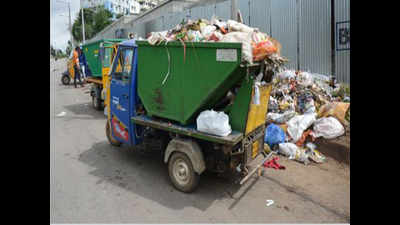- News
- City News
- bengaluru News
- 68% municipal waste in Karnataka untreated, worst in South India
Trending
This story is from February 14, 2019
68% municipal waste in Karnataka untreated, worst in South India

Karnataka generated 10,000 tonnes of waste every day
BENGALURU: As far as processing of solid waste in urban areas goes, Karnataka has the worst record in South India, and even fares poorly compared to other states like Gujarat, Delhi, Uttar Pradesh, Bihar and Jharkhand. The only major states that treat lesser waste than Karnataka does are West Bengal, Odisha and Jammu Kashmir.
According to information accessed from the Central Pollution Control Board (CPCB) and the ministry of housing and urban affairs, urban areas in India generate 1.45 lakh tonnes of trash every day, of which only 50% is processed while the remaining being disposed off or dumped in landfills unscientifically.As of January 2019, Karnataka generated 10,000 tonnes every day, of which only 3,200 tonne (32%) was processed.

In south, while Kerala—a much smaller state with only 624 tonnes of municipal waste being generated daily—may not be comparable with Karnataka, all other states, which have more garbage, process a higher percentage of it.
Years later, the situation remains pathetic with not a single state showing the capacity to treat 100% of its waste, and worse, many don’t treat half of what they generate. Some don’t even manage 25% of the trash scientifically.
“What we process may look less now, but if you compare the quality of processing we’re much better than all other states. Our segregation at source is one of the best in India, and the model we use to create compost is also better than others,” Mahendra Jain, principal secretary, urban development department, said.
While conceding that there’s a problem when it comes to residual derived fuel (RDF)—mostly because of lack of cement factories in the vicinity—he said the government is working on it.
“We’ve already signed three MoUs to generate electricity from waste and there are some other projects for waste management too. Once all these works are complete, we’ll have more capacity than the waste generated,” Jain said.
According to information accessed from the Central Pollution Control Board (CPCB) and the ministry of housing and urban affairs, urban areas in India generate 1.45 lakh tonnes of trash every day, of which only 50% is processed while the remaining being disposed off or dumped in landfills unscientifically.As of January 2019, Karnataka generated 10,000 tonnes every day, of which only 3,200 tonne (32%) was processed.

In south, while Kerala—a much smaller state with only 624 tonnes of municipal waste being generated daily—may not be comparable with Karnataka, all other states, which have more garbage, process a higher percentage of it.
In 2015, then Union minister for urban development (now vice-president), M Venkaiah Naidu had written to all mayors and heads of municipalities. “Municipal solid waste management is a big challenge that confronts our cities. Improper and unscientific handling of waste has its impact not only in terms of environmental and aesthetics of the surroundings, but also poses a threat to public health,” the letter read.
TimesView
Karnataka’s waste predicament is worsening with each passing day and its poor performance in processing trash comes as no surprise. That Bengaluru, hailed otherwise for being a techsavvy city, is still struggling to find a sustainable solution to get rid of its waste is unfortunate, to say the least. Depending heavily on landfills, where all kinds of untreated waste is dumped, is not viable in the long run as they are a major contributor to aquatic pollution and home to toxins. The solution lies in heaps of trash itself, but the government is taking only a few baby steps in setting up adequate trash-to-energy plants.
Years later, the situation remains pathetic with not a single state showing the capacity to treat 100% of its waste, and worse, many don’t treat half of what they generate. Some don’t even manage 25% of the trash scientifically.
“What we process may look less now, but if you compare the quality of processing we’re much better than all other states. Our segregation at source is one of the best in India, and the model we use to create compost is also better than others,” Mahendra Jain, principal secretary, urban development department, said.
While conceding that there’s a problem when it comes to residual derived fuel (RDF)—mostly because of lack of cement factories in the vicinity—he said the government is working on it.
“We’ve already signed three MoUs to generate electricity from waste and there are some other projects for waste management too. Once all these works are complete, we’ll have more capacity than the waste generated,” Jain said.
End of Article
FOLLOW US ON SOCIAL MEDIA










